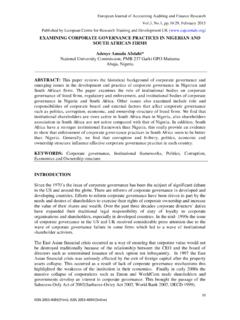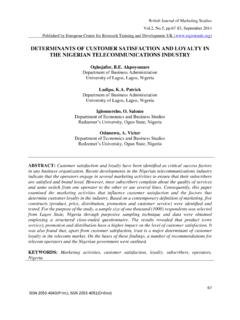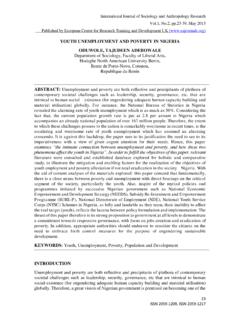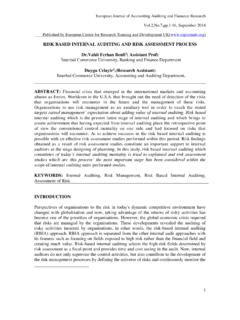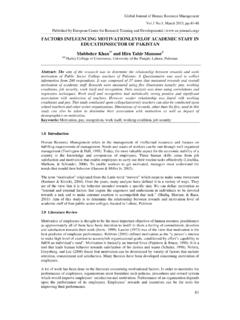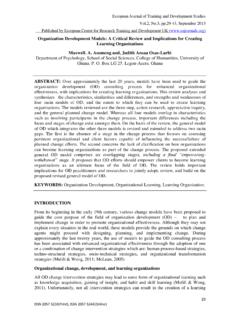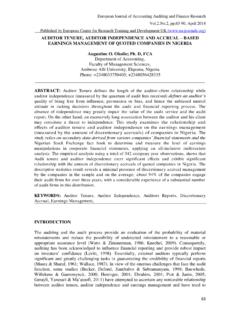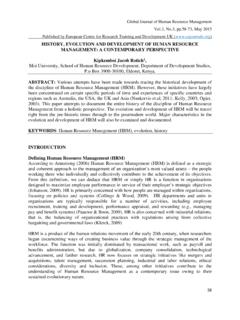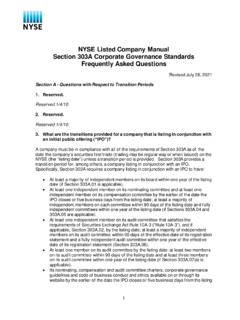Transcription of CORPORATE GOVERNANCE: THE STAKEHOLDERS ... - EA …
1 International Journal of Business and Management Review , , , May 2016 ___Published by European Centre for Research Training and Development UK ( ) 45 ISSN: 2052-6393(Print), ISSN: 2052-6407(Online) CORPORATE governance : THE STAKEHOLDERS PERSPECTIVE Onyekachi .E. Wogu School of Postgraduate Studies, Benson Idahosa University, Benin City, Edo State, Nigeria ABSTRACT: The wave of globalization and industrialization trends experienced all over the world has resulted in the emergence of large corporations as well as conglomerates. These large corporations contribute immensely to the social, economic development of their host nations.
2 This paper explores the concept of CORPORATE governance as well as the need for CORPORATE governance . Also examined are the basic principles of CORPORATE governance . The focus of this paper is on the external group of individuals ( STAKEHOLDERS ) to the organization. This paper defines them as well as their roles in ensuring CORPORATE governance and wealth creation for the business organization. It concludes by making recommendations on how businesses can strike a balance between achieving organizational goals and stakeholder needs. KEYWORDS: corporation, CORPORATE governance , management, STAKEHOLDERS .
3 INTRODUCTION Over the past century, business organizations have moved from single ownership, structure and partnerships to more complex ownership and partnerships structures. This trend is expressly demonstrated by the term Corporation. A corporation simply put refers to a business organization having perpetual existence, powers and liabilities independent of its founders and members. Corporations have been seen to play a lot of significant roles in a nation s economy all over the world. This is as a result of the fact that these corporations contribute as well as invest resources human, financial, technology etc which serve as a boot to the nation s economy where they exist.
4 Corporations over the years have been seen to gain strong influence in Nations by virtue of the extent of their wide spread activities and influence within nations. This thus implies that there is the need to pay detailed attention to these activities of corporations as they could potentially contribute positively or negatively to a given nation s social, political, environmental economic activities. On the other hand, governance means the establishment of a structure to enhance consistent, unified policies, processes and decision making with the sole aim of ensuring accountability. It is therefore on this premise that the concept of CORPORATE governance is founded.
5 It becomes expedient that these CORPORATE entities be made accountable for their actions and activities. Also serve to checkmate any form of excesses or tendencies that comes as a result of power and influence of the corporations size and resources it possesses. Sulaiman, (2003) opined that owners and managers in CORPORATE organizations via choices made regarding ownership, and capital structure of firms as well as in the design and management of internal control processes could result in the creation or destruction of economic value. As a result, CORPORATE governance has succeeded in attracting a lot of public interest due to its apparent importance for the economic health of corporations and society in general (Woghiren and Imade,2005).
6 In order to enhance a proper understanding of the concept International Journal of Business and Management Review , , , May 2016 ___Published by European Centre for Research Training and Development UK ( ) 46 ISSN: 2052-6393(Print), ISSN: 2052-6407(Online) and significance of CORPORATE governance , its various definitions, basic principles as well as groups of individuals who are involved in it are hereby explained. Why CORPORATE governance It is necessary that we look into the importance of concept of CORPORATE governance in order to enhance proper understanding about its relevance. Some of these reasons are outlined below: i.
7 Shareholders: These are the owners of the company who have entrusted the running of its affairs to management hence the interest in ensuring this privilege is not abused but utilized for the benefit of the organization. ii. Investors: The practice of good CORPORATE governance will attract investors as they will evaluate the current level of financial integrity and uprightness the organization in order to determine if their investments will be put to efficient use. iii. Economies: Countries all over the world desire good CORPORATE governance by business organizations as this in turn leads to a boost in the economy of the nation in which the business exists.
8 Iv. Going concern: The practice of good CORPORATE governance handles effectively the issue of bankruptcy and other forms of crisis. This is as a result of checks and balances that help curb any form of unethical behaviour. Definitions of CORPORATE governance CORPORATE governance refers to formal systems developed by companies to ensure accountability, oversight, and control (Ferrell, Fraedrich and Ferrell, 2005). CORPORATE governance is the term that describes the role of a corporation s executive staff and board of directors in ensuring that the firm s activities meet the goals of the firm s STAKEHOLDERS (Bateman and Snell, 2013).
9 CORPORATE governance is the system by which business corporations are directed and controlled. The CORPORATE governance structure specifies the distribution of rights and responsibilities among different participants in the corporation, such as, the board, managers, shareholders and other STAKEHOLDERS , and spells out the rules and procedures for making decisions on CORPORATE affairs. By doing this, it also provides the structure through which the company's objectives are set, and the means of attaining those objectives and monitoring performance." Organisation for Economic Co-operation and Development (OECD, April 1999).
10 CORPORATE governance is the structural system of institutional policies, implementing rules and business controls that make the framework for managing and operating inside the company (Ljubojevic and Ljubojevic, 2011). CORPORATE governance includes the sets of mechanisms and processes that help ensure that companies are redirected and managed to create value for their owners while concurrently fulfilling responsibilities to other STAKEHOLDERS . It is the combination of processes, structures and relationships through which corporations are directed and controlled. International Journal of Business and Management Review , , , May 2016 ___Published by European Centre for Research Training and Development UK ( ) 47 ISSN: 2052-6393(Print), ISSN: 2052-6407(Online) Basic principles of CORPORATE governance The concept of CORPORATE governance applies to CORPORATE businesses all over the world and there are certain principles that have become accepted as well as required to be followed (Oso & Semiu, 2012): I.
